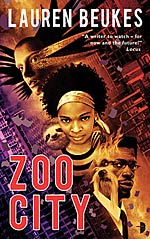
![]() charlesdee
charlesdee
5/28/2012
![]()
In this near-future South Africa, those guilty of crimes find themselves with unwanted animal companions who will never leave them and who stigmatize them as zoo people to the rest of society. Beukes heroine, Zinzi December (possibly the best name since Modesty Blaise), comes from an upper-middle-class background, is well educated, but fell into a life of drug addiction that resulted in the death of her brother. She lives with a sloth clinging to her. Her boyfriend has a mongoose. Others have Maltese terriers, black scorpions, rabbits -- there is an entire menagerie of possibilities. Since leaving prison, Zinzi makes her living finding lost objects, a feat she accomplishes by employing a mystical power whose origin is never explained. Zinzi, by the way, tells her own story.
Johannisberg is crime ridden but life goes on. Its lively music scene provides much of the novel's background. Class structure is firmly in place, but there is also black magic and raids on malls conducted by zoo people who have lions as their animal companions. And there is the Undertow, an mysterious and deadly force that arises when an animal companion dies before its human cohort.
Zinzi's finds that the elderly lady who first employs her in the novel has been savagely murdered just before Zinzi can collect her fee. At the crime scene she meets up with an unpleasant couple who want to enlist her on a missing persons case. Zinzi says she doesn't do people, just things, but she needs the money. This leads her into the world of South African pop music production. The female half of the pop duo iJusi has gone missing. Things start to get very bad.
Zoo City is short, heavy on atmosphere, and occasionally sets off on an action set piece. Zinzi is so at home in her world that she feels no need to explain much of anything. Readers must keep up. The more atmospheric sections fill in the social setting for Beukes' fantasy. She inserts a couple of sidebars from either documentaries or academic conferences to provide historical detail. In the acknowledgements she credits the professionals who helped her create this supporting evidence. One entry in a bibliography is her witty rejoinder to readers who cannot help but think of Philip Pullman'sHis Dark Materials as soon as the sloth makes its appearance. She recommends a book titled Steering by the Golden Compass: Pullman's Fantasy in the context of the ontological shift, (2005)
The fantastically bloody conclusion reminds us that for the previous 300 pages we have been visiting a world populated by characters who range from the dodgy to the malevolent.
http://www.potatoweather.blogspot.com